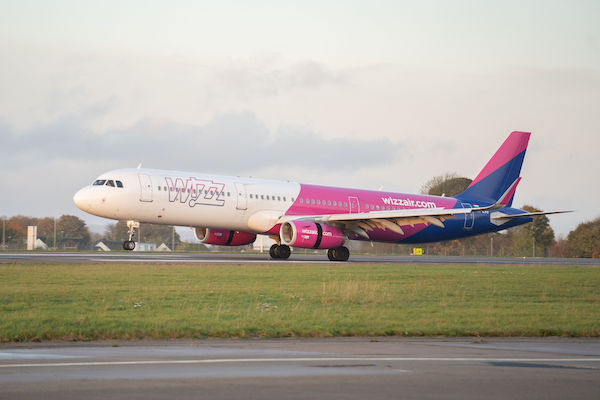April was a challenging month for Wizz Air as it faced operational disruptions due to engine recalls and a challenging seasonal travel environment.
The necessity to ground a substantial number of aircraft and the impact of an early Easter holiday led to a slight dip in the airline’s performance metrics, reflecting the complexities of airline operations.
Operational Challenges
April proved challenging for Wizz Air as engine issues significantly affected its operational performance. The airline was forced to ground 45 Airbus aircraft due to recalled Pratt & Whitney GTF engines. This grounding led to a slight reduction of 0.3% in year-on-year passenger numbers, reaching 4.9 million, and contributed to a decrease in load factor by 0.6 percentage points to 90.3% compared to the previous year.
Impact of Easter Timing
The timing of Easter also played a considerable role in affecting Wizz Air’s figures for April. With the Easter holiday occurring earlier, the usual seasonal increase in outbound travel shifted to March, reducing April’s performance. The impact was evident in the load factors, as the expected surge in travel demand had already peaked the previous month.
Fleet Adaptation and Sustainability Goals
Despite these challenges, Wizz Air is forging ahead with its fleet adaptation plans. The company has converted its Luton-based fleet to Airbus A321neos a year ahead of schedule. Alongside this, Wizz Air has set ambitious sustainability targets. By 2030, they aim to power 10% of their flights with sustainable aviation fuel (SAF), striving to reduce carbon emissions per passenger/km by 25%.
This commitment underlines Wizz Air’s proactive approach to sustainability, seeking not only to address immediate operational challenges but also to contribute positively to environmental goals.
Ryanair, contrasting with Wizz Air’s current struggles, reported an 8% increase in passenger numbers, reaching 17.3 million in April. Despite experiencing disruptions, including approximately 700 flight cancellations due to geopolitical and regulatory challenges, Ryanair maintained robust operational figures. Their load factor, however, saw a decrease from 94% to 92%.
Challenges and Comparisons
Wizz Air’s performance in April contrasts sharply with its rival Ryanair. Ryanair managed a rolling annual total of 185 million passengers, marking a 9% increase, despite significant disruptions including nearly 700 flight cancellations due to the Israel-Gaza conflict and over 340 cancellations due to a French air traffic control strike. Ryanair’s resilience, even amidst such disruptions, underscores its robust operational capacity and strategic adaptability.
The differential outcomes for these two airlines during April exemplify the challenges and unpredictabilities inherent in the aviation sector. While Wizz Air grappled with internal operational issues, Ryanair contended with external geopolitical and regulatory challenges.
Strategic Adaptations Amidst Disruptions
Wizz Air’s strategic focus remains on overcoming the prevailing challenges. By advancing the fleet modernization to Airbus A321neos and pursuing sustainability targets, Wizz Air is realigning its operational strategy to support long-term growth.
Such adaptations not only highlight the carrier’s resilience but also its commitment to future readiness and environmental responsibility, despite facing present operational hurdles.
Evaluating Operational Outcomes
Assessing the operational outcomes of both airlines, it becomes clear that adaptability and strategic foresight are key to navigating the complexities of the aviation industry. Wizz Air’s efforts to mitigate operational disruptions via rapid fleet adaptation and sustainability initiatives show a forward-thinking approach.
In contrast, Ryanair’s continued operational success, despite external pressures, highlights its adeptness at managing external threats while maintaining customer satisfaction and service levels.
This dichotomy reflects the varied strategic imperatives and response capabilities within the aviation sector, providing insights into how airlines can position themselves amidst disruptions.
Both Wizz Air and Ryanair demonstrate unique strategies to cater to evolving challenges, setting benchmarks within the industry for operational excellence and strategic resilience.
Conclusion: Future Outlook
Wizz Air’s April performance, marked by challenges due to engine recalls and seasonal travel trends, underscores the ongoing difficulties facing the airline. However, with its focus on sustainability and fleet modernization, Wizz Air is positioning itself for recovery and growth.
Ryanair’s contrasting success amidst similar challenges illustrates how strategic resilience and adaptability can lead to operational advantages, setting a competitive benchmark in Europe’s aviation market.
In conclusion, Wizz Air’s recent struggles highlight both internal and external factors impacting performance metrics, emphasising the need for strategic adaptability.
The commitment to sustainability and fleet modernization indicates a forward-looking approach, aiming for recovery in the dynamic aviation landscape.

